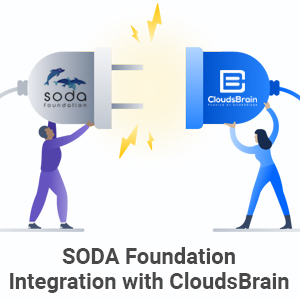


The Linux Foundation endowed in 2000, which is supported by more than 1000 members is open-source software that is collaborated with the world’s leading open-source cloud providers, storage vendors, etc. Linux Foundation is an open standard, open data, and open hardware platform. Its projects are critical to the world’s infrastructure including Linux, K8’s, Node.js, and many more. SODA Foundation is an open-source project under the Linux Foundation that aims to foster an ecosystem of open-source data management and storage software for data autonomy.
SODA Foundation integration with CloudsBrain made things able to manage and migrate petabytes of data across multiple cloud vendors efficiently, that is needed to run the business.
SODA Foundation earlier was known as OpenSDS. They want to build a platform that deals with an object, block, and file storage. The core projects are API, Dock, and Controller.
Further SODA Foundation came up with projects like multi-cloud as known as Gelato. The combination of API, dock, and the controller is known as the Hotpot project.
Click2Cloud has built a platform that accomplishes to address storage integration challenges, particularly in scale-out cloud-native environments with heterogeneous storage platforms.
SODA Foundation is incubated as an open-source project under The Linux Foundation since it is the fastest growing and most popular open-source project that Click2Cloud is contributing from the beginning, and now we are bundling with Elba release from SODA.
The CloudsBrain integration with SODA Foundation basically focused on four main objectives. Click2Cloud adopted integration of the OpenSDS multi-cloud project (also known as Gelato project), integration of Alibaba cloud in OpenSDS, CSI plugin, and Hotpot projects.
Below mention is the pictorial representation of four main objectives. Let us know in detail about these projects.
Fig: Projects integrated by CloudsBrain through SODA Foundation
Let us look at some of the types of storage module provided by CloudsBrain:
Object storage helps to store a large amount of unstructured data in a highly scalable distinct unit. Clouds Brain storage feature provides Object migration across different cloud vendors and can perform operations like create buckets, delete buckets, upload objects, download objects, and delete objects from a single platform.
Block storage is used to Replace: manage volume lifecycle and provide volumes to host and application deployed on the Kubernetes cluster. Clouds Brain’s storage feature supports block storage that stores data in form of blocks with a unique identifier. The data stored in block storage is of fixed size. Volume lifecycle management, snapshots backup is some of the services offered by block storage feature. Currently block storage support following storage drivers: Ceph, LVM, Huawei, Dorado, Huawei-Ocean Store, NetApp-Ontap, HPE-Nimble, Fujitsu.
Below are the screens of object storage and block storage of CloudsBrain.
Fig: Object Storage
Object storage management of CloudsBrain is integrated with a multi-cloud project that helps is create, migrate, monitor, and manage objects.
Fig: Block Storage
Block storage management of CloudsBrain also contains the Hotpot project of the SODA Foundation. Users can manage storage-related operations from CloudsBrain like providing storage to any host, snapshot of any volume, and uploading snapshot.
CloudsBrain supports a heterogeneous platform that includes object storage, on-premise block storage, and cloud volume. Heterogeneous storage support helps in reducing reliance on a single storage vendor, increase flexibility, cost-efficiency, and adherence to local policies.
Click2Cloud contributes to the support of the SODA project community. Also, there are other communities consists of Sakura Internet, IBM, and Scality.
Fig: CloudsBrain Dashboard
CloudsBrain saves the total cost of ownership over 62% a year by moving your infrastructure to multi-cloud environments.
CloudsBrain collaboration with SODA Foundation storage not only helps in the data management ecosystem built but also drives research in technologies.
A conventional storage system causes hardware failure, loss of data, high cost, low-speed operation, poor accessibility, etc. Thus, companies are moving to open source storage platforms for better business growth where customers meet better productivity. SODA Integration with CloudsBrain provides customers a multi-cloud storage platform for an object, block, and file storage, etc. This not only saves time and money but also leverage to disaster recovery, better productivity, more customer insights, and business growth.